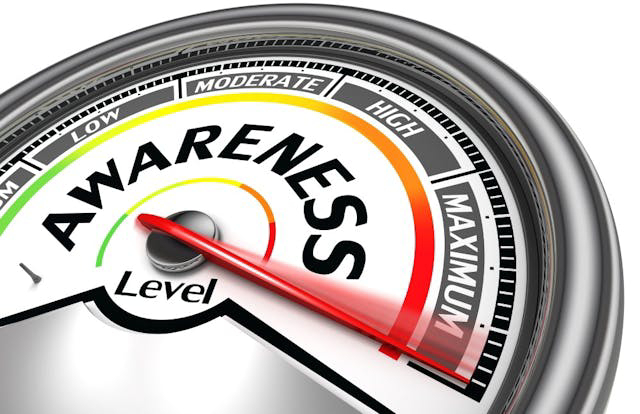Hi, good reader, how are you? Today I want to share an interesting topic, namely define awareness in psychology, The main reason why I chose this topic is because not everyone reaches a high level of awareness, besides that, many people are shackled by their own way of thinking, such as believing the past to represent the future, In my opinion, that is not a way of thinking that leads to higher consciousness, they believe in disempowering fear more than they believe in vigilant fear, here are several factors can act as blockades to increasing self-awareness:
1. Denial: Some individuals may deny or avoid confronting uncomfortable truths about themselves, which hinders self-awareness.
2. Fear: Fear of facing one's weaknesses, insecurities, or past traumas can prevent individuals from delving deep into self-exploration.
3. Distractions: Constant distractions from technology, work, or social activities can prevent individuals from dedicating time and attention to self-reflection.
4. Lack of introspection: Some people may not have developed the habit of introspection or self-reflection, leading to a lack of awareness of their thoughts, feelings, and behaviors.
5. External Validation: Relying too heavily on external validation or seeking approval from others can cloud one's ability to understand their true selves independently.
6. Closed-mindedness: A closed-minded attitude and resistance to new ideas or perspectives can limit opportunities for personal growth and self-awareness.
7. Negative self-talk: Persistent negative self-talk or self-criticism can undermine self-esteem and confidence, making it challenging to engage in constructive self-exploration.
8. Cultural or societal influences: Cultural norms or societal expectations may discourage individuals from questioning their beliefs or exploring their identities.
9. Stress and overwhelm: High levels of stress or overwhelm can make it difficult for individuals to focus on self-awareness practices and prioritize their personal development.
10. Unconscious biases: Unconscious biases and prejudices can distort one's perception of themselves and others, hindering genuine self-awareness.
Overcoming these blockades requires commitment, patience, and a willingness to confront discomfort. Engaging in self-awareness practices, seeking support from trusted individuals or professionals, and being open to introspection are essential steps in breaking through these barriers, to break the mind-barrier, sometimes we need to manipulate our own minds with information that surprises us, a little additional information, increasing self-awareness involves various practices and some techniques. Here are some strategies you can try:
1. Reflection: Take time to reflect on your thoughts, emotions, and behaviors regularly. Journaling can be an effective way to facilitate this process.
2. Mindfulness Meditation: Practice mindfulness to observe your thoughts, feelings, and bodily sensations without judgment. This helps you become more aware of your inner experiences.
3. Feedback: Seek feedback from others about your strengths, weaknesses, and blind spots. Be open to constructive criticism and use it as an opportunity for growth.
4. Self-Examination: Continuously ask yourself to probe questions to deepen your understanding of your values, beliefs, motivations, and goals.
5. Seek Different Perspectives: Engage with people from diverse backgrounds and listen to their perspectives. This can broaden your worldview and challenge your assumptions.
6. Psychological Assessments: Consider taking personality assessments or undergoing therapy to gain insights into your personality, behavior patterns, and underlying issues.
7. Practice Empathy: Cultivate empathy by putting yourself in others' shoes and trying to understand their perspectives and experiences. This can enhance your understanding of both you and others.
8. Set Goals: Establish clear, meaningful goals that align with your values and priorities. Regularly evaluate your progress and adjust your actions accordingly.
9. Pay Attention to Triggers: Notice what situations or interactions trigger certain emotions or behaviors in you. Understanding your triggers can help you manage your responses more effectively.
10. Self-compassion: Treat yourself with kindness and compassion, especially during times of difficulty or failure. Accept that nobody is perfect and learn from your mistakes without being too harsh on yourself.
Consistently practicing these strategies can gradually enhance your self-awareness and lead to personal growth and development, hopefully this article can provide insight and inspiration, good luck.
